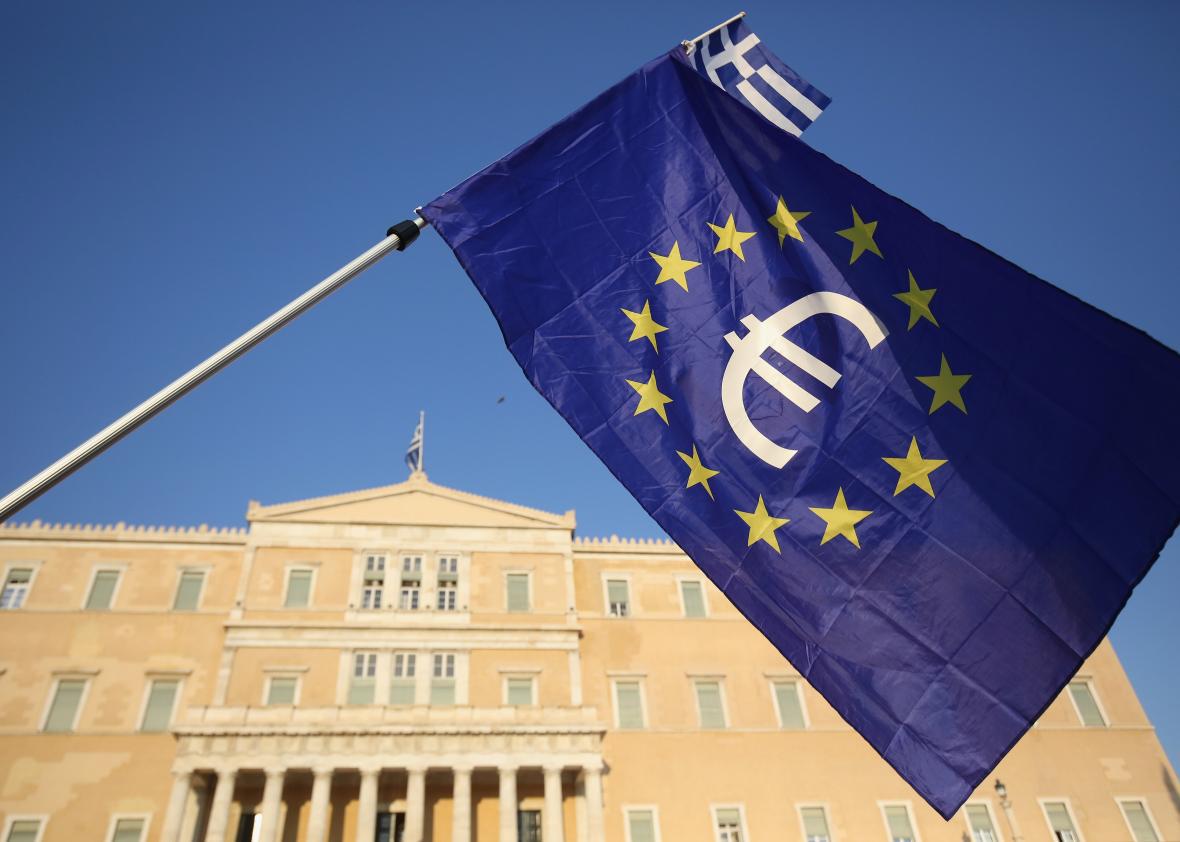In the end, Alexis Tsipras all but gave Germany naming rights to the Parthenon in order to secure a new bailout deal for Greece. After a caustic all-night negotiating session, the prime minister surrendered to nearly every demand from Europe’s leaders in return for an agreement that, theoretically, will keep his country in the eurozone and stave off an immediate economic crisis.
The first step: By Wednesday, Greece’s parliament has to swallow its pride and pass a new set of austerity and reform measures, including tax hikes and pension cuts similar to those voters rejected in a national referendum on July 5. After that, European officials will meet to hammer out the specifics of a final package, which should give Greece as much as €86 billion of loans over three years, including money to shore up its battered banking system.
By all accounts, the demands will be harsher than earlier offers by Europe that Tsipras and his left-wing Syriza party spurned. For instance, Greece will need to plunk €50 billion of state assets into an investment fund so that they can be sold into private hands. The profits will largely be used to pay down the country’s debts.
Observers on hand for Sunday night’s meeting said Tsipras was simply “crucified.” More than one described him as looking “like a beaten dog.” As a final indignity, he will likely need to rely on the support of opposition leaders in parliament to actually pass the deal. But Tsipras was always bound to lose this fight, because from the outset, all of the leverage in these talks belonged to Germany, which wanted to make no concessions at all.
While Greece sought debt relief, it never wanted to leave the euro. So, in order to get what they wanted, Tsipras and his pugnacious former finance minister Yanis Varoufakis had to hope that the threat of a Grexit would be so frightening to Greece’s creditors that they would give ground to prevent it. But early on, Germany’s leaders decided that it would be acceptable if Greece packed up its ruins and left the monetary union. Europe had fortified its financial system to withstand the potential fallout in the markets, and cutting the intransigent Greeks loose would provide a powerful warning to other debtor nations, like Spain, that might consider rebelling against demands for fiscal austerity.
Worse yet, Greece’s banks were surviving entirely on borrowed money from the European Central Bank. Without it, they simply would have imploded. That put the onus on Greece to find a solution before Europe’s technocrats simply pulled the plug on its financial system. You can see the desperation of their situation thanks to the fall-back plan that Varoufakis had in mind if that happened. In his thinking, the government would simply issue IOUs to pay its bills, repudiate some of its debts to Europe, and seize the Bank of Greece from the ECB in order to prove once and for all that it was ready to default and exit the euro. If that had happened, chances are that Angela Merkel would have simply said, “Go for it.”
Greece may get a couple of small consolation prizes in this accord. The agreement says that Europe will consider restructuring some of the country’s debt by offering longer grace periods and lowering interest rates, though it won’t write off any of the face value outright. Greece will also get to keep the privatization fund in Athens. Originally, Germany wanted it managed in Luxembourg, which Tsipras thought would have been a national humiliation.
But, as I wrote last week, Tsipras has just dragged his country through a financial panic that forced it to close its banks and let commerce grind to a standstill. And all he has to show for it is a worse deal.
